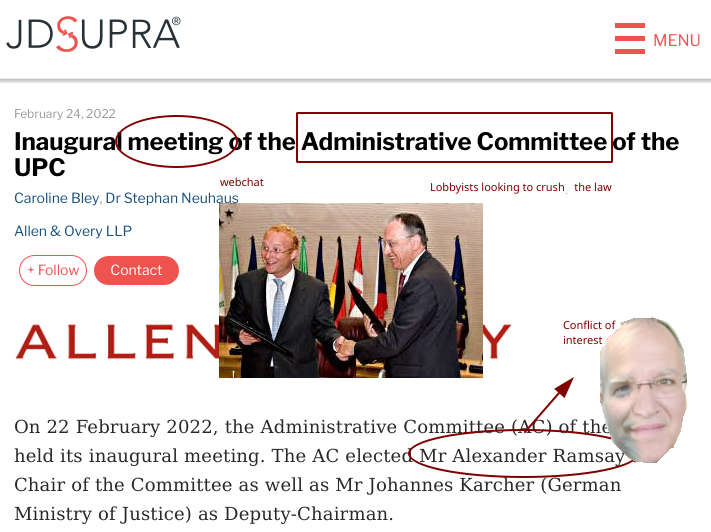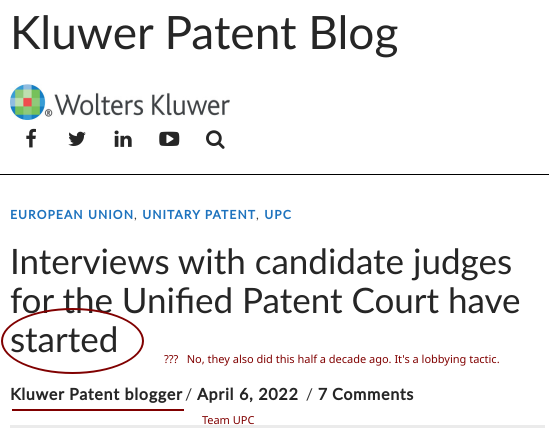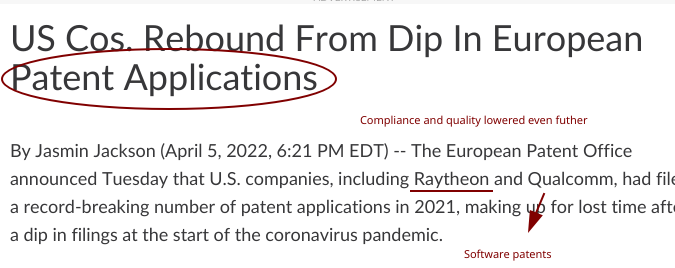Team UPC and Corrupt EPO Management Have Fast Become a Severe Crisis of Legitimacy for the European Union
- Dr. Roy Schestowitz
- 2022-04-17 10:56:27 UTC
- Modified: 2022-04-17 10:56:27 UTC
Some recent headlines (lies, fake news):


 The comments
The comments (as usual) smash this jingoistic nonsense -- a call to break the law and violate constitutions:
Patent robot
APRIL 6, 2022 AT 7:35 PM
The PAP already started with the (withdrawn) ratification of the UK, as required by the LAW, and the UPC will start with a seat in London, as required by the LAW.
Again: is all this LEGAL?
Attentive Observer
APRIL 6, 2022 AT 10:17 PM
If I am not wrong there should have been a declaration according Art 31/32 VCLT in order to replace the necessary ratification of the PAP by the UK with IT. This was announced by Mr Ramsay, but further to this announcement nothing seems to have actually happened in this matter.
Has such a declaration ever been signed or has the secretariat of the commission simply created a “fait accompli”?
How is it possible that an advisory committee convenes in order to select judges if this legal “home work” has not been carried out?
I would think if there is an institution in which the rule of law should be a prime concern, it is the UPC.
Or are vested interests such that the rule of law is simply ignored?
One of those...
APRIL 7, 2022 AT 8:11 PM
If organisations which have been created to apply a specific law refuse to do so, but still hold the requirements of this law against their employees……
Looking at a famous Art. 4a CBE.
It just shows, law is for those who are not strong enough to ignore it.
Management can simply ignore it.
No Administrativ Council seat member makes a step to risk his seat, same in the UPC apparently.
William Garry
APRIL 7, 2022 AT 7:51 PM
No parliament involved in the interview of those judges.
‘Democracy’ has been stolen.
LightBlue
APRIL 8, 2022 AT 9:34 AM
William, the EU has certain problems with judges being appointed by politicians, referencing Poland and Hungary for example (though ignoring other countries where judges are political appointments, such as Germany).
Simona Fonzi
APRIL 8, 2022 AT 10:20 AM
Another recent CJEU decision in PL Holdings vs Poland on the legality of international courts dealing with EU law recalls the role of National Courts:
http://arbitrationblog.kluwerarbitration.com/2021/05/05/is-there-room-to-hope-for-non-treaty-based-isds-in-the-eu-remarks-on-ag-kokotts-opinion-in-case-c-109-20-poland-v-pl-holdings/
“AG Kokott concludes that individual arbitration agreements between investors and Member States concerning the “sovereign application of EU law” are compatible with Articles 267 and 344 TFEU ***only if national courts*** can comprehensively verify the award’s compliance with EU law and refer the matter to the CJEU if necessary.”
“Third, for such non-treaty-based arbitrations over “sovereign measures for enforcing EU law” to comply with Articles 267 and 344 TFEU, the resulting award must be open to “comprehensive” review by the Member State courts as to its compatibility with EU law.”
Yes, but!
APRIL 11, 2022 AT 6:17 PM
That in many countries judges are actually appointed by politicians is common.
For the highest French Court, the Conseil Constitutionel, the President of the Republic, the chair of the Parliament and of the Senate have the right to appoint. Even former presidents of the republic are members as of right. The appointments are thus highly political.
In Germany the same applies to the German Federal Constitutional Court. The right to present candidates is given to the parties in the parliament. The new President of the GFCC was directly appointed from his seat as MoP to the GFCC. When one realises that he was one of the MoP which had much more income from other duties than that earned as MoP, doubts can be raised whether he is as independent as he claims to be. He was a very active lawyer.
In other words some designation of judges are highly political and there is not a lot to be done about it.
If those highest judges are former judges or renowned legal scholars showing a free mind, there is not much to be said about their political appointment.
The problem starts when there the appointment is the result of co-opting friends and buddies (as was the case for the drafting committee of the rules of procedure of the UPC), or with intent to push aside actual judges which are not abiding by some party line, like in Poland.
For the time being, I would give the judges appointed to the UPC the benefit of the doubt.
In any case as said by another commenter, the legal home work for those judges has not been done, cf. the “ratification” of the PAP and Art 7(2) UPCA.
This put a shadow on the appointing body and on the appointed judges.
The
EPO has become a weapon against the EU's credibility. Thank
Benoît Battistelli and
António Campinos for that?

More
European software patents? Or
proper patents one can successfully enforce in a court? (A
real court, not UPC unicorns and kangaroos)




